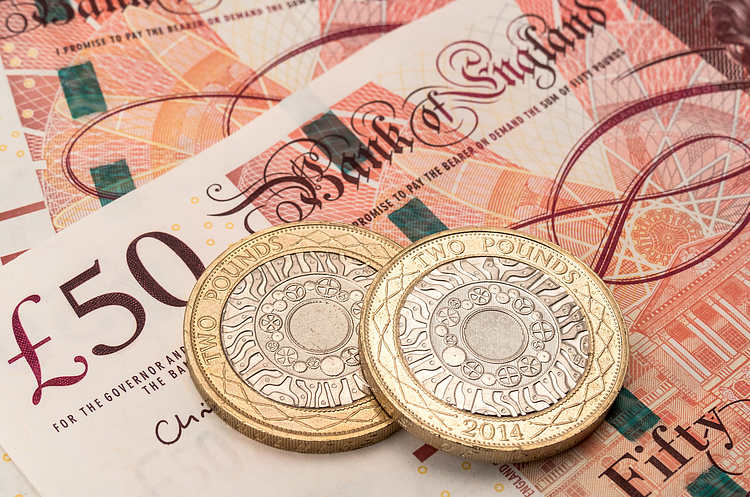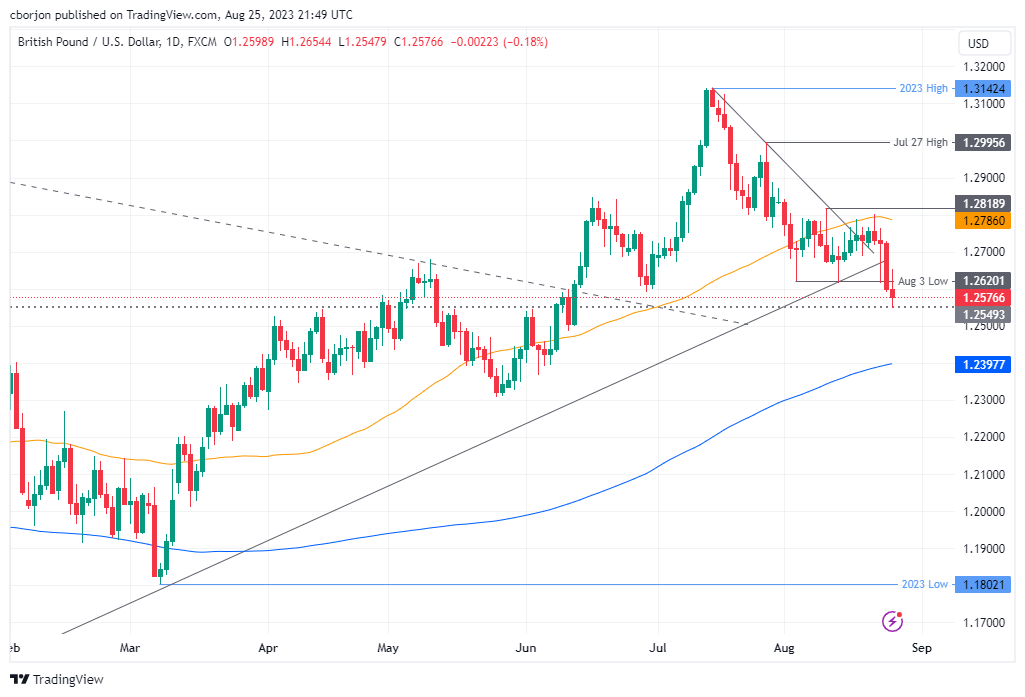- GBP/USD falls 0.18%, as concerns over global business activity and China’s real estate market woes fuel a risk-off environment.
- US Dollar Index (DXY) advances 0.19% to around two-month highs, buoyed by Powell’s hawkish remarks on inflation and rate hikes at Jackson Hole.
- Mixed US economic data, including lower-than-expected Initial Jobless Claims, adds complexity to rate hike expectations, keeping traders cautious.
The Pound Sterling (GBP) finished the week on a lower note against the US Dollar (USD), falling to hold above the 1.2600 figure, with the GBP/USD sliding toward new two-month lows. As the New York session winds down, the pair is trading at 1.2576, down 0.18%, after hitting a daily high of 1.2654.
Pound struggles on risk-off mood, strong US Dollar weighs, markets eye next week’s US economic data
The GBP/USD was affected by several reasons. Reports that slowing global business activity, as revealed by S&P Global PMIs featured in the UK and the US, triggered flows towards safety on a risk-off mood and weighed on the major. Alongside that, China’s real estate market woes, with Evergrande’s filing for bankruptcy in New York last Friday and Country Garden’s removal from the Hong Kong Hang Seng index, increased worries about a worldwide economic downturn.
Consequently, the Greenback (USD) advanced, as shown by the US Dollar Index (DXY), which measures the buck’s performance against a basket of six currencies that includes the Cable, advanced 0.19%, finished the week at 104.187, at around new two month highs.
Data from the United States (US) witnessed a mixed report in Durable Goods Orders, while the labor market remained hot, as the US Bureau of Labor Statistics (BLS) revealed. Initial Jobless Claims for the week ending August 19 rose by 230K, below estimates of 239K, justifying additional rate increases by the US Federal Reserve (Fed), as the Chair Jerome Powell emphasized on Friday, in his speech at the Jackson Hole Symposium.
At Jackson Hole, the US Federal Reserve Chair Jerome Powell highlighted the ongoing concerns of the central bank regarding high inflation. He stated that further rate hikes could be “appropriate,” though he stressed the US central bank would continue to rely on incoming data. Powell mentioned even though a couple of months showed an acceleration in the disinflation process, he underscored the significance of staying aligned with the Fed’s 2% inflation target, signaling that there is still a considerable journey ahead.
Powell stated that the robust economic expansion and a constrained labor market could pave the way for additional tightening measures. He noted that further rate hikes would be warranted if these positive economic indicators do not exhibit signs of easing.
Recently, Philadelphia Fed’s Patrick Harker remarked that current interest rates are already at a restrictive level, and in the event inflation falters, there might be a necessity for additional rate hikes. Conversely, Cleveland Fed President Loretta Mester acknowledged that the economy has gained momentum, as evidenced by GDP and labor market indicators. She highlighted that a lower growth rate would be necessary to temper inflation while emphasizing the ongoing debate around whether the present rates are sufficiently restrictive to attain the inflation target.
Next week, the UK economic docket will be absent. On the contrary, the US economic docket will feature the CB Consumer Confidence, JOLTs report, preliminary GDP data, inflation figures, ISM PMI, and further Fed speakers.
GBP/USD Price Analysis: Technical outlook
The GBP/USD daily chart portrays the pair as neutral to downward biased, but the break below the latest market structure swing low at 1.2590 could exacerbate a test of the 200-day Moving Average (DMA) at 1.2397. Firstly, sellers must drag the exchange rate below the 1.2500 figure. A breach of the latter would expose the 1.2400 figure, followed by the 200-DMA. Conversely, if buyers reclaim 1.2600, that could open the door for a recovery towards the 1.2700 mark.

